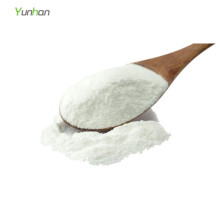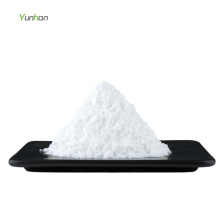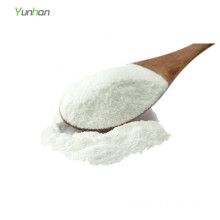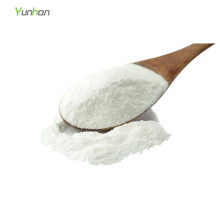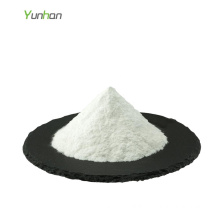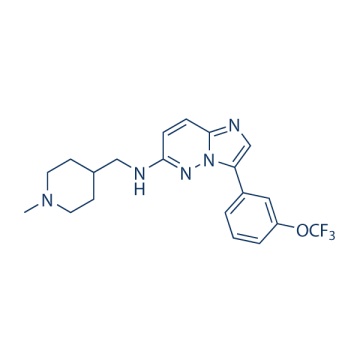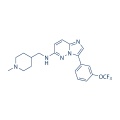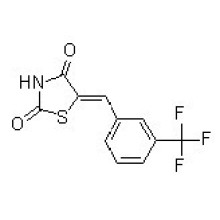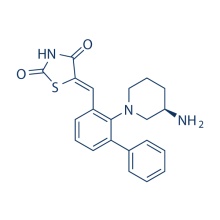SGI-1776 free base 1025065-69-3
Product Description
.cp_wz table {border-top: 1px solid #ccc;border-left:1px solid #ccc; } .cp_wz table td{border-right: 1px solid #ccc; border-bottom: 1px solid #ccc; padding: 5px 0px 0px 5px;} .cp_wz table th {border-right: 1px solid #ccc;border-bottom: 1px solid #ccc; padding: 5px 0px 0px 5px;}
Molecular Weight:
405.42 SGI-1776 is a novel ATP competitive inhibitor of Pim1 with IC50 of 7 nM, 50- and 10-fold selective versus Pim2 and Pim3, also potent to Flt3 and haspin. Phase 1.
Biological Activity
In addition to Pim, SGI-1776 also potently targets FLT3 (IC50 = 44nM).
Treatment of AML cells with SGI-1776 results in a
concentration-dependent induction of Apoptosis. Importantly, SGI-1776 is
also cytotoxic in AML primary cells, irrespective of FLT3 mutation
status and results in Mcl-1 protein decline. Treatment of
CLL cells with SGI-1776 results in a concentration-dependent induction
of apoptosis.
SGI-1776 induces apoptosis in CLL and that the mechanism
involves Mcl-1 reduction. Apoptosis induction coupled with the
inhibition of RNA synthesis is observed in CLL cells treated with
SGI-1776. SGI-1776 exhibites cytotoxic activity in vitro
with a median relative IC50 of 3.1 mM. SGI-1776 induces tumor growth
inhibition meeting criteria for intermediate EFS T/C activity in 1 of 39
evaluable models. In contrast, SGI-1776 induces complete responses of
subcutaneous MV4;11.
Consistent with cell line data, xenograft model studies with mice bearing MV-4-11 tumors shows efficacy with SGI-1776. SGI-1776 has shown preclinical activity against leukemia and solid
tumor cell line models with IC50 values of 0.005–11.68 mM. SGI-1776
induces significant differences in EFS distribution in vivo in 9 of 31
solid tumor xenografts and in 1 of 8 of the evaluable ALL xenografts.
Kinase Assays
Kinase inhibition is measured by the use of radiometric assays performed
by KinaseProfiler service. Assays contain a peptide substrate, known
purified recombinant human kinases, gamma-labeled ATP, magnesium ion,
and a fixed concentration (1 μM) of SGI-1776. In a final reaction volume
of 25 μL, 5 to 10 mU of Pim1/2/3 is incubated with 8 mM of MOPS, pH
7.0; 0.2 mM ethylene diamine tetraacetic acid; 100 μM KKRNRTLTV;10 mM
MgAcetate; and [γ-32P-ATP] .
The reaction is initiated by the
addition of the MgATP mix. After incubation for 40 minutes at room
temperature, the reaction is stopped by the addition of 5 μL of a 3%
phosphoric acid solution. Then, 10 μL of the reaction is spotted onto a
P30 filtermat and washed 3 times for 5 minutes in 75 mM phosphoric acid
and once in methanol before it is dried and measured via a scintillation
counter.
Method
Cells are cultured in IMDM (ATCC) supplemented with 10% FBS and grown in a 37oC incubator with 5% CO2.
Cells are routinely tested for Mycoplasma infection using a
commercially available kit. Cells are treated with DMSO or various
concentrations of SGI-1776 for 24 hours. Cells (1×106) are
washed, then resuspended in 100 μL of annexin binding buffer, mixed with
5 μL of FITC solution and 5 μL of propidium iodide (PI; 50 μg/mL)
solution. For each sample, 1×104 cells are measured using a Becton Dickinson FACSCalibur flow cytometer.
Contact us if you need more details on 1025065-69-3. We are ready to answer your questions on packaging, logistics, certification or any other aspects about SGI-1776 Free Base 1025065-69-3、1025065-69-3 SGI-1776 Free Base. If these products fail to match your need, please contact us and we would like to provide relevant information.
Molecular Weight:
405.42 SGI-1776 is a novel ATP competitive inhibitor of Pim1 with IC50 of 7 nM, 50- and 10-fold selective versus Pim2 and Pim3, also potent to Flt3 and haspin. Phase 1.
Biological Activity
In addition to Pim, SGI-1776 also potently targets FLT3 (IC50 = 44nM).
Treatment of AML cells with SGI-1776 results in a
concentration-dependent induction of Apoptosis. Importantly, SGI-1776 is
also cytotoxic in AML primary cells, irrespective of FLT3 mutation
status and results in Mcl-1 protein decline. Treatment of
CLL cells with SGI-1776 results in a concentration-dependent induction
of apoptosis.
SGI-1776 induces apoptosis in CLL and that the mechanism
involves Mcl-1 reduction. Apoptosis induction coupled with the
inhibition of RNA synthesis is observed in CLL cells treated with
SGI-1776. SGI-1776 exhibites cytotoxic activity in vitro
with a median relative IC50 of 3.1 mM. SGI-1776 induces tumor growth
inhibition meeting criteria for intermediate EFS T/C activity in 1 of 39
evaluable models. In contrast, SGI-1776 induces complete responses of
subcutaneous MV4;11.
Consistent with cell line data, xenograft model studies with mice bearing MV-4-11 tumors shows efficacy with SGI-1776. SGI-1776 has shown preclinical activity against leukemia and solid
tumor cell line models with IC50 values of 0.005–11.68 mM. SGI-1776
induces significant differences in EFS distribution in vivo in 9 of 31
solid tumor xenografts and in 1 of 8 of the evaluable ALL xenografts.
Kinase Assays
Kinase inhibition is measured by the use of radiometric assays performed
by KinaseProfiler service. Assays contain a peptide substrate, known
purified recombinant human kinases, gamma-labeled ATP, magnesium ion,
and a fixed concentration (1 μM) of SGI-1776. In a final reaction volume
of 25 μL, 5 to 10 mU of Pim1/2/3 is incubated with 8 mM of MOPS, pH
7.0; 0.2 mM ethylene diamine tetraacetic acid; 100 μM KKRNRTLTV;10 mM
MgAcetate; and [γ-32P-ATP] .
The reaction is initiated by the
addition of the MgATP mix. After incubation for 40 minutes at room
temperature, the reaction is stopped by the addition of 5 μL of a 3%
phosphoric acid solution. Then, 10 μL of the reaction is spotted onto a
P30 filtermat and washed 3 times for 5 minutes in 75 mM phosphoric acid
and once in methanol before it is dried and measured via a scintillation
counter.
Method
Cells are cultured in IMDM (ATCC) supplemented with 10% FBS and grown in a 37oC incubator with 5% CO2.
Cells are routinely tested for Mycoplasma infection using a
commercially available kit. Cells are treated with DMSO or various
concentrations of SGI-1776 for 24 hours. Cells (1×106) are
washed, then resuspended in 100 μL of annexin binding buffer, mixed with
5 μL of FITC solution and 5 μL of propidium iodide (PI; 50 μg/mL)
solution. For each sample, 1×104 cells are measured using a Becton Dickinson FACSCalibur flow cytometer.
Contact us if you need more details on 1025065-69-3. We are ready to answer your questions on packaging, logistics, certification or any other aspects about SGI-1776 Free Base 1025065-69-3、1025065-69-3 SGI-1776 Free Base. If these products fail to match your need, please contact us and we would like to provide relevant information.
Product Categories : Epigenetics > Pim Inhibitor
Other Products
Hot Products
Astragaloside AChlortetracycline HCl 64-72-2Paclitaxel 33069-62-4Dexamethasone Acetate 1177-87-3Dinaciclib (SCH727965) 779353-01-4CHIR-124 405168-58-3Ro3280 1062243-51-9TAME 901-47-3CCG-1423 285986-88-110058-F4 403811-55-2Dabigatran (BIBR 953) 211914-51-1H 89 2HCl 130964-39-5T0901317 293754-55-9Aprepitant 170729-80-3Turofexorate Isopropyl (XL335) 629664-81-9BMS-378806 357263-13-9
